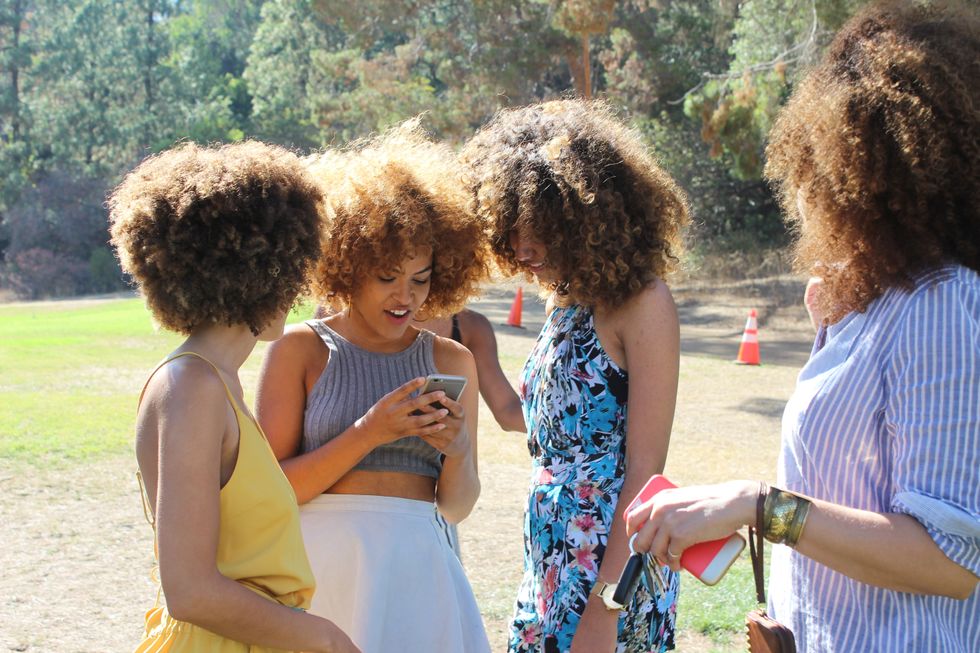My eighth birthday marks my earliest memory of straightening my hair. I dreaded the routine; having waist-length hair gave no aid to the seemingly endless process of hot tools being held to my roots and dragged downward, steam rising from my scalp. Burnt ears, brittle ends, and complaints of tangles and frizz were trademarked experiences. However unfavorable, the process never failed to elicit: “Your hair looks so nice like this! You should wear it that way more often.”
From age eight onward, I tried to. A majority of the people in my life are certain that my hair is straight and have never believed it to appear otherwise. I have worked diligently to maintain that popular understanding. I’ve invested in expensive titanium tools, smoothing shampoos, and the like. The girl with curly hair is not one that many know to exist.
It took me years to understand the power of the words I heard at age eight. This inherent preference for straight, sleek hair is one that women have obsessed over for centuries. Hair discrimination is largely systematized, and permits that women who wear their natural curls be disadvantaged in schools, the workplace, and other social settings. Black women have experienced the most negative societal repercussions for wearing their hair natural. The “Good Hair Study” implements a Hair Implicit Association Test to measure the implications of the term “Good Hair.” Overwhelmingly, findings indicate that “good” denotes smoothness and silkiness, and abides by normalized European beauty standards. They note that “while the ‘good hair’ standard has historical roots, it is perpetuated by pervasive cultural messages that idealize this vision of hair and offer treatments or products to achieve it.”
My experience is not comparable to theirs. As the study states, “women of other races and ethnicities who have curly or textured hair may experience pressure to conform to these beauty standards; but black women, in a sense, are often pitted against them.”
There is, however, a remarkably evident generational difference in hair perception. Recent years have seen the rise of ‘naturalistas’: women who spearhead a movement towards acceptance and normalization of natural hair in society. Per the study, “79% of black millennial (under age 30) naturalistas currently wear their hair in a natural style.” In addition, “millennial naturalistas have more positive attitudes toward textured hair than all other women.”
In conversation with peers that now proudly wear and celebrate their textured hair, the impact of those millennial naturalistas is undeniable.
One student recalls: “I was seeing a new image of black women across all kinds of media, and all those women wore their hair naturally. The natural hair movement was far reaching, especially on the internet...I was sick of not being myself. I wanted to finally accept myself in ways that I hadn't before. Growing up, black girls are often told that their hair was not ‘good hair’...So basically at 17 I was like f*ck that shit and stopped chemically straightening my hair.”
Another, who was raised natural states: “My grandmother didn’t know how to take proper care of my mother’s hair when she was growing up and a lot of the braiding techniques she’d do would put such strain on my mother’s hairline that her edges started breaking. She started doing her own hair in her teens, but perms were so popular at the time, that she gave in and went along with the trend, only to regret it years later. So she raised us natural, so that our hair wouldn’t end up like hers did.”
To those considering going natural, they say:
1. Be patient- your hair may not be flourishing right away, give it time. Rome wasn't built in a day.
2. Love your texture. Most of the time, girls who are going natural haven't seen their true hair texture in over ten years. When you're able to feel it and touch it and comb it, you're gonna love it.
3. For healthy, long natural hair, you must go fully natural. Forgo products with harsh chemicals in the labels (i.e. ones with silicones, parabens, etc.) Stick to products made specifically for natural hair.
On the hardest things about going natural:
“Don't get me wrong, I love my hair, but it's high maintenance. It requires a lot of care and sometimes I get lazy. My hair was far more manageable when it was straight, but I'd rather trade manageability for healthy hair.”
Furthermore, “the hardest thing for many is that it is very time-consuming. To take care of your hair, you must be gentle with it.”
Finally, on the topic of gaining the confidence to wear natural hair:
“Don’t be afraid to take on the challenge. It won’t be easy, and a lot of the time, you may feel like you’ve been working hard on your hair for so long and aren’t seeing any results. The journey to healthy hair is tough, but it is so worth it in the end.” Additionally, “people will not like it and that's okay- some of those people will be your own family. They may even say ‘your hair looked so much better straight.’ Ignore them and carry on.”
Their words are resonant with anyone fearful of going natural, in the process of it, or advocating for it. Though my own acceptance of my hair has yet to come, it is refreshing to see the transformative shift in attitudes towards natural hair, and the movement that accompanies it.
Natural hair IS good hair.

















